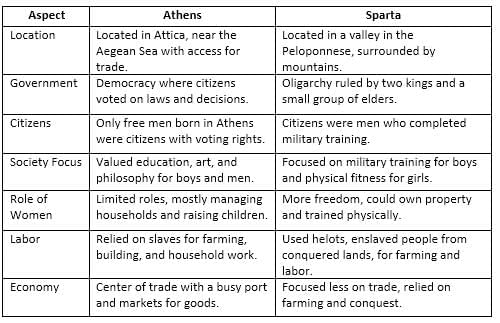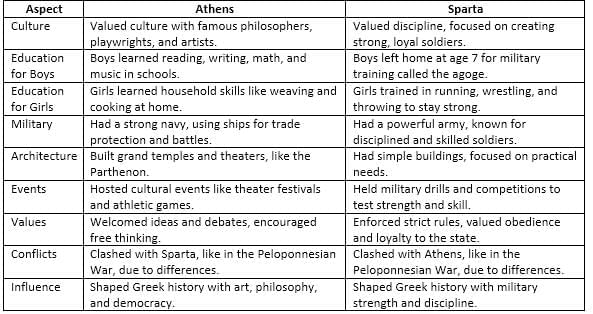Greece Chapter Notes | Social Studies for Grade 6 PDF Download
| Table of contents |

|
| Introduction |

|
| Classical Athens |

|
| Comparing Athens and Sparta |

|
| Alexander the Great |

|
Introduction
Ancient Greece was a remarkable civilization that grew thousands of years ago in a region with mountains, islands, and a warm climate. This chapter explores the city-states of Athens and Sparta, their unique ways of life, and the incredible achievements of a leader named Alexander the Great. You will learn about the geography, society, government, and culture of Classical Athens, compare it with Sparta, and discover how Alexander spread Greek ideas across a vast empire. These notes will help you understand why Ancient Greece is so important in history!
Classical Athens
Geography and Society
Classical Athens was a major city-state in Ancient Greece during the 5th and 4th centuries BCE.
- It was located in a region called Attica, surrounded by mountains and near the Aegean Sea.
- The geography included rocky hills, small plains for farming, and a port called Piraeus for trade.
- The warm, sunny climate allowed people to grow olives, grapes, and grains.
- Athens was a busy center for trade, with ships bringing goods like pottery, wine, and olive oil.
- Society was divided into different groups: citizens, metics, and slaves.
- Only free men born in Athens were citizens and could vote or hold office.
- Metics were foreigners living in Athens who could work but had no political rights.
- Slaves did much of the hard work, like farming, mining, or household tasks.
- Women in Athens had limited rights, mostly managing homes and raising children.
- Education was important for boys, who learned reading, writing, math, and music.
- Girls were taught at home, learning skills like weaving and cooking.
- Athenians valued community, often gathering in public spaces like the agora (marketplace).
- Religion was a big part of life, with festivals and temples for gods like Athena, the city’s protector.
Government and Culture
Athens had a democracy, a system where citizens could vote on decisions.
- Only male citizens over 18 could participate in the government.
- The Assembly was a group where citizens met to discuss and vote on laws.
- The Council of 500 planned meetings and suggested laws for the Assembly to vote on.
- Leaders called archons helped run the city and its courts.
- Courts used juries made of citizens to decide legal cases fairly.
- Athenian culture was rich, with art, theater, and philosophy flourishing.
- Plays, including tragedies and comedies, were performed at festivals like the Dionysia.
- Famous playwrights like Sophocles and Aristophanes wrote stories about gods and heroes.
- Philosophers like Socrates, Plato, and Aristotle asked big questions about life and truth.
- Architecture was grand, with buildings like the Parthenon, a temple for Athena.
- Sculptors created detailed statues of gods, heroes, and athletes.
- Athenians loved sports and held events like the Panathenaic Games to honor Athena.
- Science and math grew, with thinkers like Pythagoras studying numbers and shapes.
- Literature, like the epic poems of Homer, was widely read and shared.
Comparing Athens and Sparta
Part I

Part II

Alexander the Great
Alexander the Great was a king of Macedon, a region north of Greece, in the 4th century BCE.
- He was born in 356 BCE and taught by the philosopher Aristotle as a young boy.
- His father, King Philip II, united many Greek city-states under Macedonian rule.
- Alexander became king at age 20 after his father was assassinated.
- He was a brilliant military leader, never losing a battle in his conquests.
- Alexander created a vast empire, conquering Persia, Egypt, Mesopotamia, and parts of India.
- His army used a phalanx, a tight formation of soldiers with long spears, to win battles.
- He founded many cities named Alexandria, spreading Greek culture and ideas.
- This blending of Greek and local cultures was called Hellenistic culture.
- Hellenistic culture mixed Greek art, language, and ideas with those of other regions.
- Alexander encouraged trade and learning, building libraries and schools in his empire.
- He treated conquered people fairly, often letting them keep their customs.
- Alexander died at age 32 in 323 BCE, possibly from illness, in Babylon.
- After his death, his empire split into smaller kingdoms ruled by his generals.
- His legacy lived on through Hellenistic culture, influencing art, science, and government.
|
83 docs|22 tests
|
FAQs on Greece Chapter Notes - Social Studies for Grade 6
| 1. What were the key features of the geography of Classical Athens and how did they influence its society? |  |
| 2. How was the government of Classical Athens structured, and what role did democracy play in it? |  |
| 3. What were the main differences between the societies of Athens and Sparta? |  |
| 4. How did Alexander the Great impact Greece and its surrounding regions? |  |
| 5. What cultural achievements are attributed to Classical Athens, and how did they reflect its values? |  |














